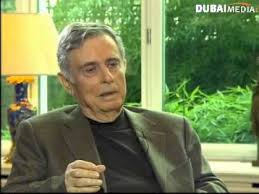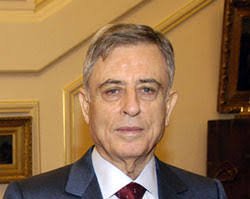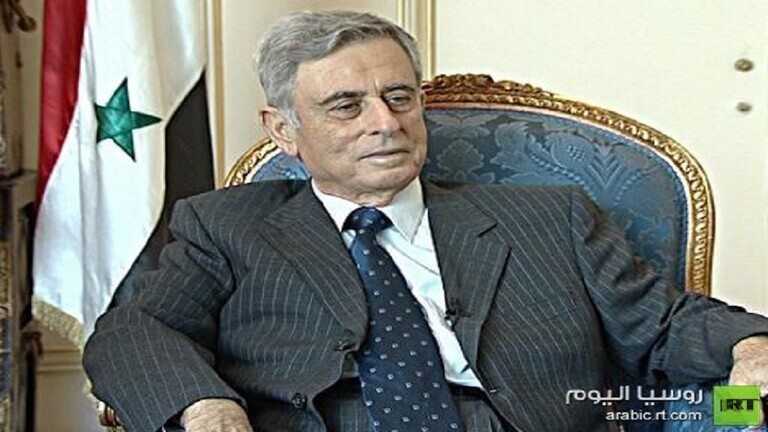Abdul-Halim Khaddam… A politician who participated in the establishment of Hafez’s regime and maintained his prominence for thirty years. Through his responsibility for foreign policy, Damascus became a pivotal capital. To have a quick glimpse into Abdul-Halim Khaddam’s hands, where he held Hafez al-Assad, Lebanon, Tehran, kings, Bush, and the Gulf War… where Damascus, where the modern history of Syria! A special interview with (Arab Panorama).
- What was the reason for the delay in forming the body?
The reason was the focus on selecting non-partisan national figures, exchanging opinions, and discussing many issues that eventually formed the provisions and goals of the body. All of this required time.
- Doesn’t this delay have political consequences?
I don’t think so, especially in the absence of clarity and clear goals presented by the councils and bodies that were formed before.
- What about your influence on the domestic situation?
No one really has an influence on the street now; everyone is following it. But what matters to us now is not conveying political messages to the outside, but rather protecting the Syrian street and stopping the killing machine that has shed the blood of this people, and this can only be achieved through external intervention.
- One of the main provisions of the main committee is your announcement of support for international intervention to save the Syrian people. What made you bolder than others in declaring this?
Others, whether the National Council or others, still invoke the jurisprudence of the past, where they swore by Baghdad and others when they considered any international intervention to be a conspiracy and imperialism, otherwise what saved Libya and its people from Gaddafi! It is enough to note that these are the same slogans that the regime itself continues to repeat, the regime that persistently tries to pit sects against each other.
- Why is Talal Al-Turkawi the head of the body… and he is a resident of Riyadh?
Absolutely not. Mr. Talal is a young national figure with no party affiliation. He is from the city of Homs and leads a well-known tribe in the country. His presence in Riyadh is his natural place of residence.
- But you sent a written message to Riyadh, as we have learned?
That is correct, the document was sent to the embassy in accordance with diplomatic conventions and it reached Riyadh.
- What is the content of the message? And why Riyadh?
As for the content of the message, it concerns the recipient, and according to diplomatic conventions, the content of the message and talking about it is the right of the sending country, so there is no possibility of revealing its content. As for why Riyadh, it is because it is a pivotal country, and in light of Iran’s control over Iraq, its influence in Palestinian affairs, and its presence in Lebanon through Hezbollah, and with the current absence of Egypt after Mubarak’s fall, Riyadh, and Riyadh alone, has the greatest role in preserving the Arab identity, not to mention its ability to support the Syrian people.
- Can we say that President Assad is no longer capable of change and compromise even if he wanted to?
- Yes, he is no longer capable of that. According to the information I have, Bashar does not spend two consecutive nights in one place.
- So, is he no longer able to carry out his threats?
- How can he ignite the region when he does not have control over a significant part of the Syrian interior? We heard the same thing from Saddam, Gaddafi, and you can see how it ended for all of them.
- Well, does he still consider external intervention an option?
- He is afraid now, and look at the number and size of the decisions he issues and then reverses; there is clear inconsistency. In general, he is an unsettled person. He believes that continuing the killing will ultimately lead to the defeat of the revolution or gradually undermine its resolve.
- In the era of the late Hafez al-Assad, you often maneuvered and excelled in presenting compromises while maintaining the dignity of foreign policy and its performance. Did Assad’s son cancel the idea of compromises from his agenda?
- True, and this is due to his wrong policies. He is an imbalanced person. With his bloodshed in this way, he has left himself no room to turn back. He believes that the continuation of killing will ultimately lead to the defeat of the revolution or gradually undermine its resolve.
- Assuming that the youth uprising had occurred during the time of Assad the father, how would you have dealt with it?
- Whether in the past or now, dictatorships ultimately face their demise. The technological revolution has opened up vast possibilities for change. In the past or now, change and development are inevitable.
- Are you the one most capable of understanding how to deal with the Ba’athist regime in Damascus?
- All I hope for is that young people will have the leading role in the coming stage, and good news will appear very soon.



